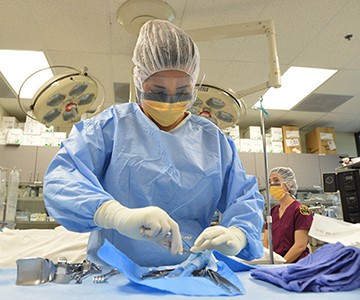How to Become a Surgical Technologist

Should I train to become a Surgical Technologist?
Do you think surgical technology is the right career for you? If you are detail-oriented and work well in stressful situations, becoming a surgical technologist could be a great career choice. Read on to learn:
- What surgical technologists (also known as operating room technicians) do on the job
- Where surgical technologists work and how much they reportedly make
- The skills and characteristics needed to be a successful surgical tech
- Surgical technologist certifications and licenses (benefits and requirements)
- How to become a surgical technologist
What does a Surgical Technologist do?
Surgical Technologists play an important role in the healthcare industry. According to the Bureau of Labor Statistics (BLS), Surgical Technologists typically do the following:
- Prepare operating rooms for surgery
- Sterilize equipment and make sure that there are adequate supplies for surgery
- Ready patients for surgery, such as washing and disinfecting incision sites
- Help surgeons during surgery by passing them instruments and other sterile supplies
- Count supplies, such as sponges and instruments
- Assist in maintaining a sterile surgical environment
Why should I become a Surgical Technologist?
According to the U.S. News & World Report, Surgical Technology ranks #18 in best healthcare support jobs and #92 in the 100 best jobs. These rankings are based on a variety of factors, such as salary, job market, growth, stress level and work/life balance.
Surgical Technologists also are in high demand as the need for them is projected to grow over the next 10 years. The BLS reports that “employment of surgical technologists is projected to grow 12 percent from 2016 to 2026, faster than the average of all occupations. Advances in medical technology have made surgery safer, and more operations are being done to treat a variety of illnesses and injuries.”
How much do Surgical Technologists make?
As for pay, the median annual wage for surgical technologists nationwide was $45,160 in May 2016, according to a BLS report. In the state of California, the annual mean wage for surgical technologists is even higher at $59,490, and the state has the second-highest employment level for Surgical Technologists in the U.S., according to the BLS geographic profile for the occupation.
Where do Surgical Technologists work?
As you would expect, a majority of surgical technologists work in hospitals, according to the Commission on Accreditation of Allied Health Education Programs (CAAHEP). Some also work in outpatient surgicenters, through private employment by physicians, or as self-employed technologists.
Is Surgical Technology right for me?
If you have the following important qualities, it could indicate that a career as a surgical technologist is right for you:
- Detail-oriented. Surgical technologists must pay close attention to their work at all times and be able to provide the correct sterile equipment for surgeons during an operation.
- Dexterous. Surgical technologists should be comfortable working with their hands. They must provide needed surgical equipment quickly.
- Have integrity. Because they are trusted to provide sterile supplies and quality patient care during surgical procedures, surgical technologists must be ethical and honest.
- Good physical stamina. Surgical technologists should be comfortable standing for extended periods.
- Stress-management skills. Working in an operating room can be stressful. Surgical technologists should work well under pressure while providing a high level of care.
Do I need to be certified to work as a Surgical Technologist?
The BLS states that certification for Surgical Technologists can be beneficial in finding a job. The Association of Surgical Technologists reports that Surgical Technologists are certified following successful completion of a CAAHEP-accredited program or other programmatically-accredited surgical technology program and the national Certified Surgical Technologist (CST) examination administered by the National Board of Surgical Technology and Surgical Assisting.
Becoming a Surgical Tech: What steps can I take?
The first step is to attend an accredited community college or technical school to earn an associate’s degree in surgical technology. It’s important to become certified in CPR or basic life support, or both, as some jobs may require it, says the BLS.
In SJVC’s Surgical Technology program, students can earn an Associate of Science degree in approximately 15 months. Graduates also earn CPR certification and are eligible to apply to the National Board of Technology and Surgical Assisting (NBSTSA) to sit for the Certified Surgical Technologist (CST) National Certification Exam.
Request more information or call 866-544-7898 to speak with an admissions advisor about SJVC’s Surgical Technology Program.
Learn More About Surgical Technology
Would you like to learn more about Surgical Technology and becoming a Surgical Technologist? Read more about it by checking out our guide on Surgical Technology.
You might also like
More stories about
Request Information
All fields using an asterik (*) are required.


